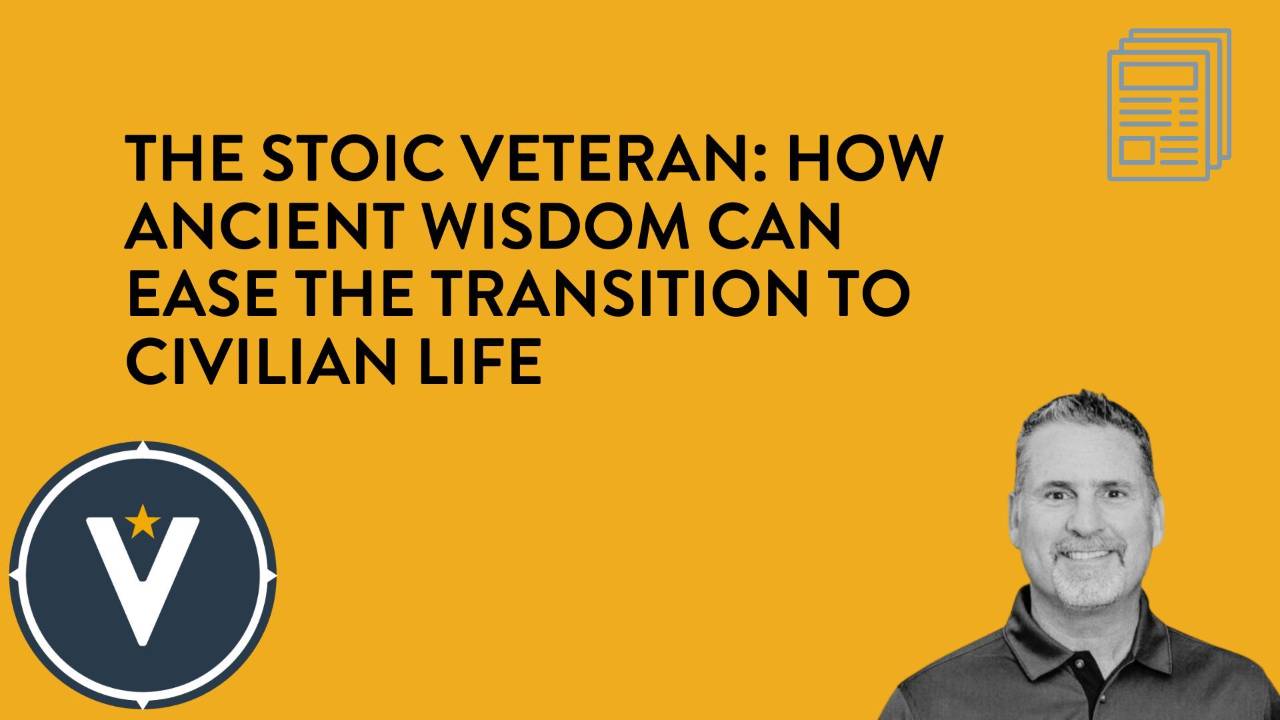The Stoic Veteran: How Ancient Wisdom Can Ease the Transition to Civilian Life
Jul 16, 2025
When Ken Davenport speaks about transition, he doesn’t start with a resume template or a list of job boards. He starts with mindset—and more specifically, Stoicism. A leadership philosophy over 2,000 years old has become one of the most practical tools for veterans adjusting to civilian life.
“The core tenet of Stoicism is pretty simple,” Ken says. “You don’t control what happens to you in life, but you can control your reaction.” That distinction—between what’s within our power and what’s not—isn’t just philosophical. For many veterans, it’s life-saving.
Why Veterans Struggle with Transition
Leaving military service often involves far more than a career change. It’s the unraveling of identity, purpose, and community all at once. As Ken puts it, “You’re going from something that you know really well to something that you have no idea about. You’ve got a million things coming at you at a million miles per hour.”
The result? Anxiety. Paralysis. Shame. Pressure to "figure it all out." Veterans are often told to jump straight into the job market—learn LinkedIn, perfect your elevator pitch, apply for jobs. But without clarity on who you are and what truly matters to you, those steps can feel hollow.
That’s where Stoicism—and Vector Accelerator—come in.
What Stoicism Teaches Veterans
Ken Davenport wrote the book The Stoic Transition as a response to what he saw in the veteran community: a deep fear of the unknown, and a lack of practical mental frameworks to navigate it. “It’s the original self-empowerment philosophy,” he says. “It’s 2,000-year-old mindfulness.”
Here are a few of the Stoic principles he highlights—and why they matter for anyone leaving the military:
1. Focus on What You Can Control
Veterans don’t control the job market. They don’t control what their MOS translates to in the private sector. But they do control how they prepare, how they respond, and how they tell their story.
“You may actually start a job and decide you don’t like it,” Ken says. “That’s the learning process. Failure is a gift. Embrace the discomfort.”
2. Practice Amor Fati (Love of Fate)
Amor Fati means “love your fate.” Even when it’s difficult. Even when it doesn’t make sense yet.
This mindset reframes setbacks as necessary steps in your journey. “You may not have all the answers,” Ken shares, “but you can embrace the suck. You can love the process of figuring it out.”
3. Live According to Values, Not Expectations
For many veterans—and parents, as Ken noted in his story about his son not attending college—there’s a powerful pull to follow the script handed to them. College, white-collar job, 9-to-5 stability.
But as Ken reminds us, “Most of those jobs are not satisfying in any way once they get there. I’ve seen so many veterans who get the six-figure job and realize, ‘My God, I’m miserable.’”
4. Know That Meaning Doesn’t Always Come from Work
A controversial but crucial idea: work doesn’t have to be your mission. “Work is work for a reason,” Ken says. “Sometimes you just need to make money to fund the rest of your life.”
Purpose can be found in coaching Little League, volunteering, or being a strong presence in your community. Self-complexity theory, as discussed in the episode, shows that people with more diverse self-identities tend to weather life’s storms better. Don’t bet everything on your job title.
How Vector Accelerator Applies These Ideas
Vector Accelerator exists to give veterans a structured way to practice these very ideas. Before talking careers, the program focuses on clarity—on identity, values, and motivations. That’s the introspective work most programs skip.
Participants journal their way through questions about priorities, backstory, and purpose. They share in group discussions. They map out what success looks like for them, not what society or the military told them it should look like.
And it works.
A 2024 report on Vector Accelerator’s outcomes shows that 72% of participants experienced an increase in hope, and 67% reported a stronger sense of purpose. Hope, it turns out, is not just a feeling—it’s predictive of greater resilience, stronger relationships, and more engaged citizenship.
The Final Word from Ken
If he could tell one thing to every transitioning veteran, it’s this:
“You’re going to crush civilian life. You have all the skills, all the tools. It may not happen immediately, but you’re going to get to where you want to go. Don’t stress it.”
It’s simple. But as Ken also reminds us, “Simple doesn’t make it easy.” That’s why a disciplined practice—whether it’s journaling, stoicism, or the Vector curriculum—can make all the difference.
Want to Start Your Own Stoic Transition?
Download the Clear Future Checklist at vectoraccelerator.org to begin your journey. Or dive deeper into Ken’s books, The Stoic Transition and The Stoic Edge, available on Amazon.
Clarity. Conviction. Confidence. Your next mission starts here.
How clear are you about your future?
Download a FREE Clear Future Checklist Now!



